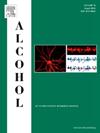酒精、衰老和肠道微生物群:免疫、屏障功能障碍和疾病的交叉点。
IF 2.9
4区 医学
Q3 PHARMACOLOGY & PHARMACY
引用次数: 0
摘要
饮酒对人体健康具有复杂的剂量依赖性和环境依赖性影响,特别是通过影响肠道微生物群、肠道屏障完整性、免疫调节和衰老过程。遗传变异和年龄增长是改变酒精相关疾病风险的两个主要因素,而且往往相互作用。在遗传因素中,普遍存在的醛脱氢酶2多态性(ALDH2*2)影响乙醛清除,导致有毒代谢物积累、氧化应激和肠道通透性增加,从而破坏肠道微生物群落,即使在低水平饮酒时也是如此。大量和长期饮酒会进一步破坏肠道微生物群落,侵蚀粘膜完整性,引发全身炎症,导致酒精相关性肝病(ALD)、神经炎症和多器官损伤。衰老通过促进慢性低度炎症和免疫反应受损,增加对酒精诱导病理的易感性,从而加剧了这些影响。在特定情况下,例如某些自身免疫性疾病,低至中度酒精摄入可能会发挥免疫调节作用并影响肠道微生物群,可能有助于减少炎症和改变微生物组成。这篇综述综合了目前关于酒精、宿主遗传、肠道微生物群、免疫调节途径和衰老如何相互影响疾病风险的机制见解。随着全球人口老龄化和酒精相关健康问题负担的增加,迫切需要采取综合的系统级方法。未来的研究应优先考虑基于精确的、以肠道为目标的策略,旨在恢复微生物平衡,维持肠道屏障的完整性,并在整个生命周期中减轻酒精相关的危害。本文章由计算机程序翻译,如有差异,请以英文原文为准。

Alcohol, aging, and the gut microbiome: Intersections of immunity, barrier dysfunction, and disease
Alcohol consumption exerts complex, dose- and context-dependent effects on human health, particularly by influencing the gut microbiome, intestinal barrier integrity, immune regulation, and aging processes. Genetic variation and advancing age are two major, and often interacting, factors that modify the risk of alcohol-related diseases. Among genetic factors, the prevalent aldehyde dehydrogenase 2 polymorphism (ALDH2∗2) compromises acetaldehyde clearance, driving toxic metabolite accumulation, oxidative stress, and increased intestinal permeability that disrupts gut microbial communities, even at low levels of alcohol consumption. Heavy and chronic alcohol use further disrupts gut microbial communities, erodes mucosal integrity, and drives systemic inflammation, contributing to alcohol-associated liver disease (ALD), neuroinflammation, and multi-organ injury. Aging independently worsens these effects by promoting chronic low-grade inflammation and impaired immune responses, heightening susceptibility to alcohol-induced pathology. In specific contexts, such as certain autoimmune diseases, low to moderate alcohol intake may exert immunomodulatory effects and influence the gut microbiome, potentially contributing to reduced inflammation and alterations in microbial composition. This review synthesizes current mechanistic insights into how alcohol, host genetics, the gut microbiome, immune regulatory pathways, and aging intersect to influence disease risk. As global populations age and the burden of alcohol-related health issues rises, there is an urgent need for integrated, systems-level approaches. Future research should prioritize precision-based, gut-targeted strategies aimed at restoring microbial balance, maintaining intestinal barrier integrity, and mitigating alcohol-related harm across the lifespan.
求助全文
通过发布文献求助,成功后即可免费获取论文全文。
去求助
来源期刊

Alcohol
医学-毒理学
CiteScore
4.60
自引率
4.30%
发文量
74
审稿时长
15.6 weeks
期刊介绍:
Alcohol is an international, peer-reviewed journal that is devoted to publishing multi-disciplinary biomedical research on all aspects of the actions or effects of alcohol on the nervous system or on other organ systems. Emphasis is given to studies into the causes and consequences of alcohol abuse and alcoholism, and biomedical aspects of diagnosis, etiology, treatment or prevention of alcohol-related health effects.
Intended for both research scientists and practicing clinicians, the journal publishes original research on the neurobiological, neurobehavioral, and pathophysiological processes associated with alcohol drinking, alcohol abuse, alcohol-seeking behavior, tolerance, dependence, withdrawal, protracted abstinence, and relapse. In addition, the journal reports studies on the effects alcohol on brain mechanisms of neuroplasticity over the life span, biological factors associated with adolescent alcohol abuse, pharmacotherapeutic strategies in the treatment of alcoholism, biological and biochemical markers of alcohol abuse and alcoholism, pathological effects of uncontrolled drinking, biomedical and molecular factors in the effects on liver, immune system, and other organ systems, and biomedical aspects of fetal alcohol spectrum disorder including mechanisms of damage, diagnosis and early detection, treatment, and prevention. Articles are published from all levels of biomedical inquiry, including the following: molecular and cellular studies of alcohol''s actions in vitro and in vivo; animal model studies of genetic, pharmacological, behavioral, developmental or pathophysiological aspects of alcohol; human studies of genetic, behavioral, cognitive, neuroimaging, or pathological aspects of alcohol drinking; clinical studies of diagnosis (including dual diagnosis), treatment, prevention, and epidemiology. The journal will publish 9 issues per year; the accepted abbreviation for Alcohol for bibliographic citation is Alcohol.
 求助内容:
求助内容: 应助结果提醒方式:
应助结果提醒方式:


